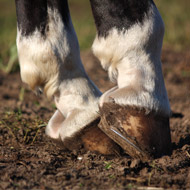
Study findings pave the way for new research and treatment
An equine specialist is calling for a new approach to equine laminitis as recent research shows most cases of laminitis are a clinical sign of systemic disease.
Writing in The Veterinary Journal, Professor Cathy McGowan from the University of Liverpool said that her findings ‘have provoked a rethink of our clinical and research strategies for this condition’.
For the past decade, Professor McGowan has been leading an investigation into laminitis caused by hormonal dysregulation and endocrine laminitis. Her ground-breaking work revealed that laminitis was caused by insulin - overturning previous ideas about the disease and paving the way for new research and treatment.
Professor McGowan gained an understanding of abnormal insulin regulation from her work as a veterinary specialist where she has treated many horses and ponies with endocrine diseases. She noted that what they all had in common was abnormal insulin regulation.
In her research, Professor McGowan highlighted three major advances in the understanding of laminitis: First, laminitis is now considered to be a disease that affects multiple organs and tissues, or affects the body systemically. Second, endocrine laminitis is now believed to be the predominant form in animals presenting for lameness.
Her third discovery was that, under the microscope, changes in the hoof lamellae were subtle in comparison with previous descriptions. She noted that some horses may experience a prolonged subclinical phase, as demonstrated by the development of divergent hoof rings visible on the hoof wall.
“These findings completely change the way we think about a very important disease in horses,” Professor McGowan explained. “This is very important to the equine industry and veterinary profession and will be the basis of future research directions.”



 The latest
The latest